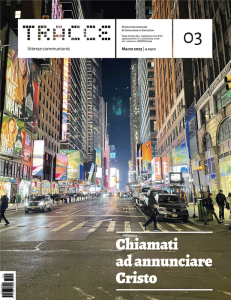Arkiv, Samtaler
Samtale med Luca Fiore
En samtale ført i løpet av The New York Encounter som berører Kirkens tilstand, Kafka, Ildefonso Schuster, tidens tegn, takknemlighet og kallet til hellighet.
This year, the Encounter wished to reflect on the need – evidenced by our time’s hard circumstances marked by the pandemic and by warfare – to come up with a visible response, a fact susceptible of encounter, that might by virtue of presence provide an answer to the questions and wounds we carry. What does this signify for you?
It’s hard to generalise. By definition, an encounter is a personal reality. From the beginning, Christianity was transmitted by way of contagion. A blessed contagion. What matters is that we be carriers of the fire of Christ’s presence. The classical image is that of the wanderers to Emmaus, who asked themselves, ‘Were not out hearts burning within us while he talks to us on the road?’ The fire is a function of his presence. I was touched by what John Cavadini, professor of theology at Notre Dame, said during the presentation of Don Giussani’s The Religious Sense during the Encounter. Citing a phrase of Kafka’s, which features in the book’s last paragraph (‘Even if salvation does not occur, I wish, at every moment, to be worthy of it’), he spoke of his desire to remain worthy of the redemption Christ has wrought in us. That is, of his desire to live within a logic of waiting, of openness. A life realised in this manner has consequences for other lives. Seraphim of Sarov, a monk and starets of the Russian Church, said: ‘Find the spirit of peace in yourself, and thousands around you will find salvation.’ This is the case, not because I come along carrying something wonderful, but because I’ve been entrusted with the task of being a sign, an indication. This is a provocation for all in order that we might all be credible, coherent signs, able to orient other lives towards the source of life.
Quest’anno l’Encounter vuole rifletere sull’esigenza – esplosa per le difficili circostanze di questo tempo, dalla pandemia alla guerra – di imbattersi in una risposta visibile, un fatto incontrabile, che risponda con la sua presenza agli interrogativi e alle ferite che portiamo addosso. Per lei che cosa significa?
È difficile generalizzare. L’incontro, per definizione, è una realtà personale. Il cristianesimo, fin dagli inizi, si è comunicato per contagio. Un contagio benedetto. Quel che conta è essere portatori del fuoco della presenza di Cristo. L’immagine classica sono i discepoli di Emmaus, che si domandano: «Non ci ardeva forse il cuore nel petto mentre conversava con noi lungo il cammino?». Il fuoco è in funzione della Sua presenza. Questo è l’essenziale. Mi ha toccato molto ciò che John Cavadini, professore di Teologia a Notre Dame, ha detto durante la presentazione de Il senso religioso qui all’Encounter. Citando la frase di Franz Kafka, contenuta nell’ultimo paragrafo del libro – «Anche se la salvezza non viene, voglio però esserne degno a ogni momento» –, ha parlato del suo desiderio di rimanere degni della redenzione che Cristo ha operato in noi. Cioè, vivere in questa logica di attesa, di apertura. E una vita che si realizza in questo modo ha conseguenze per le altre vite. Dice Serafino di Sarov, monaco e starets della Chiesa russa: «Se tu trovi in te lo spirito di pace, migliaia intorno a te troveranno la salvezza». E non è così perché sono io a portare qualcosa, ma perché a me è affidato il compito di essere segno, indicazione. Questa è una provocazione a tutti, perché possiamo essere segni credibili, coerenti, capaci di orientare altre vite verso la fonte della vita.
You can find the full text here (in Italian).

